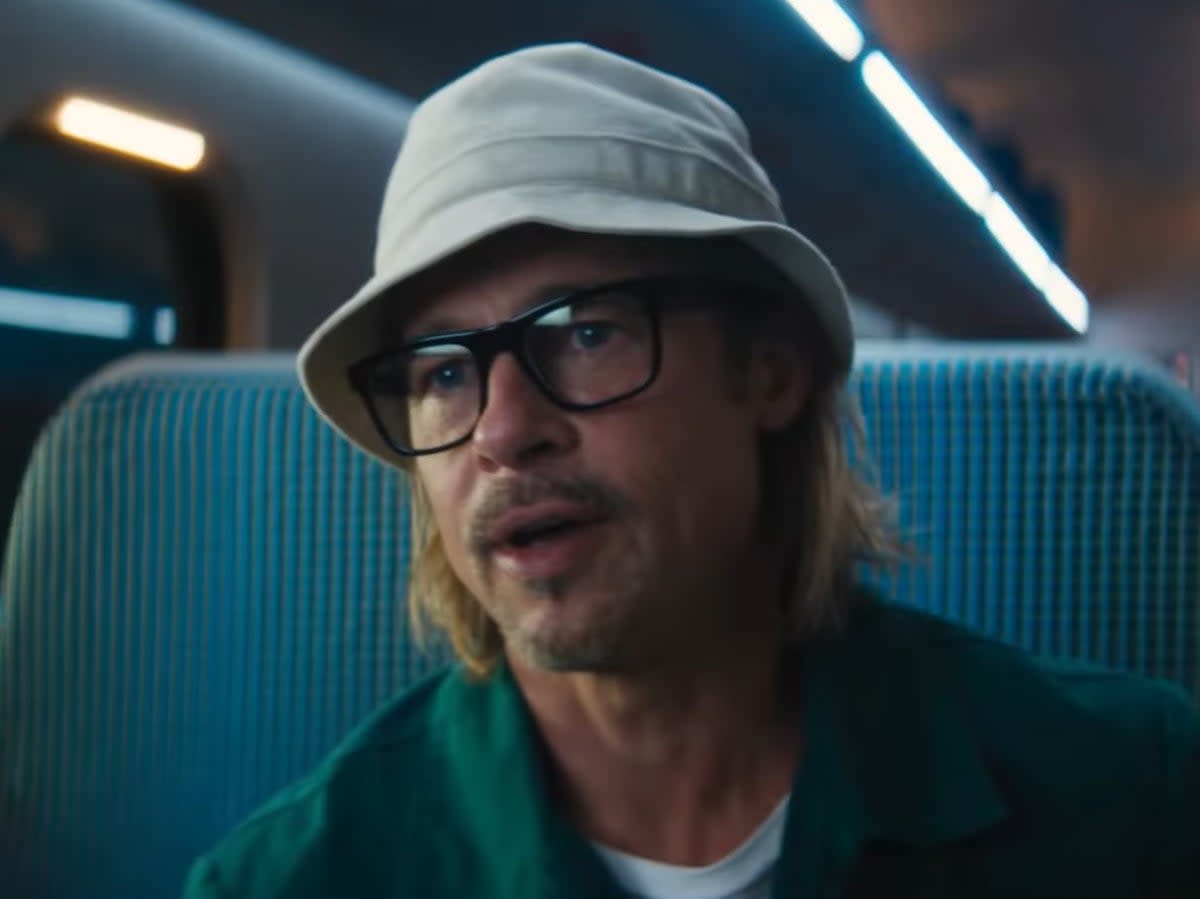Voices: There’s a big problem with the Brad Pitt movie Bullet Train

- Oops!Something went wrong.Please try again later.
Ah, Bullet Train.
I’ve been looking forward to Bullet Train because Kotaro Isaka’s book of that name (from which it is adapted) is a straight-up banger, a delightfully twisted page-turner. One of its major characters is a ruthless assassin who obsessively (and knowledgeably) quotes Thomas the Tank Engine, for goodness’ sake. That’s wonderfully warped.
When I got to Lemon’s first chapter – Lemon is the character’s name – I was hooked. And there’s plenty more besides that to like about it. The problem with the film, however, is obvious even in advance of its release next week. It just looks wrong. I mean, where are the Japanese actors? In the promos and the trailers and all. Why are they in the background?
I’m not going to mention cultural appropriation here, because I fear that term is overused. Nor am I going to write a treatise on Hollywood’s still-poor treatment of Asian actors, although I could. This isn’t me trying to be “woke” – a word I don’t like because it’s a ridiculous, overexposed term mostly used as a stick by the right’s gibbering cultural warriors. Or “PC”, its forerunner. In point of fact, the cast is actually an admirably diverse one. Which is welcome.
It replaces Isaka’s Japanese team of assassins (although they’re not really a team) with an international cast. But, come on. This is a story set on a Japanese cultural icon, a bullet train – high-speed rail done properly, years before the UK started spaffing money up the wall for something that probably won’t be as good. That it pushes the Japanese characters into the background, at least in so far as the promotional material goes, is jarring. It just is. It looks wrong.
I get Brad Pitt’s involvement. It’s devilishly hard to break any film that doesn’t either involve superheroes or come from some other successful pre-existing property – like Top Gun’s sequel, for example – right now. If you’re launching something new, it’s much easier if you have an A-list name with a string of nine-figure hits front and centre.
But surely the writers could have achieved that without so obviously making the Japanese characters sit in the back row? Audiences have proved very receptive to Japan’s cultural exports, anime in particular. Demon Slayer: Mugen Train racked up half a billion dollars in global ticket sales for a movie that was trippy, and sometimes out-and-out strange, while still managing to retain an emotional core. And, at least in this country, it had to overcome a 15 certificate.
The wonderful Drive My Car was more of a critical (and an arthouse) hit, as opposed to a bona fide international smash, perhaps unsurprisingly given its three-hour runtime and Chekhov obsession. But a hit it was, in those terms, and it picked up Best Picture, Best Adapted Screenplay and Best Director nods at the Oscars before carrying off the inevitable Best International Feature to add to its bulging trophy cabinet.
So don’t tell me Japanese properties won’t sell to international audiences unless they’re first internationalised. They can. And do. It isn’t just South Korea, with its Parasite and Squid Game, that is capable of producing global hits. Perhaps it’s my long-held appreciation for Japan’s rich cinematic tradition, and its other cultural exports, that makes me uncomfortable about this film – which is set in Japan, but seems to want to distance itself from the country at the same time.
Audiences raised on Netflix, with its deep well of high-quality foreign-language content, are a lot more open-minded than Hollywood gives them credit for. They are, I think, capable of seeing the problem. They’re not as stupid as movie executives like to think they are. I should point out that Isaka himself has spoken out in favour of the film – something that is worthy of note. It is, of course, going to sell him a lot of books, and get his work in front of a global audience (a good thing). But there are plenty of authors in a similar position who’ve seen adaptations of their work and cried foul.
To keep up to speed with all the latest opinions and comment sign up to our free weekly Voices Dispatches newsletter by clicking here
Put it this way: imagine a Robin Hood film that tries to excise Nottingham, and with only the parts of Alan-a-Dale and Friar Tuck reserved for British actors. Think about how that would go down with the right-wing tabloids.
You want to see how badly wrong it can go with a miscast Robin? Check out Kevin Costner’s turn in green, if you can put up with constantly hearing Brian bloody Adams singing “Everything I Do” throughout the film. You might be better off watching it with the volume turned down, except during Alan Rickman’s scenes (he steals the movie as the Sheriff of Nottingham).
Look, I’m going to see Bullet Train. I love the book, and popcorn action flicks can be a real tonic if done well. This one doesn’t have to equal John Wick (and it probably won’t). It would only need to be a little better than The Gray Man to make the trip worthwhile.
But Hollywood can, and should, do better with its casting choices. And yes, I am going to say it: it does seem to have a blind spot when it comes to Asian actors generally – and that needs correcting.

